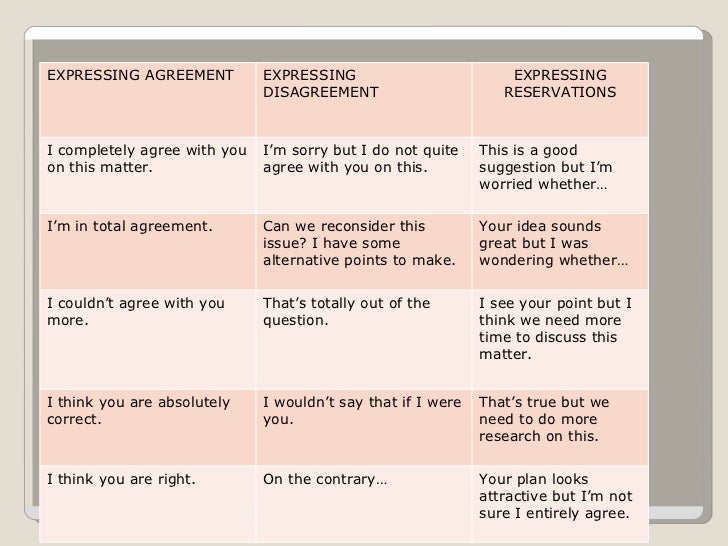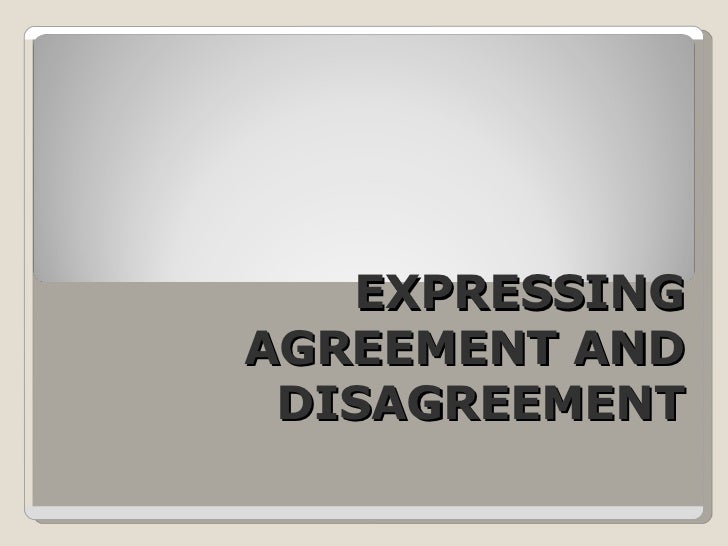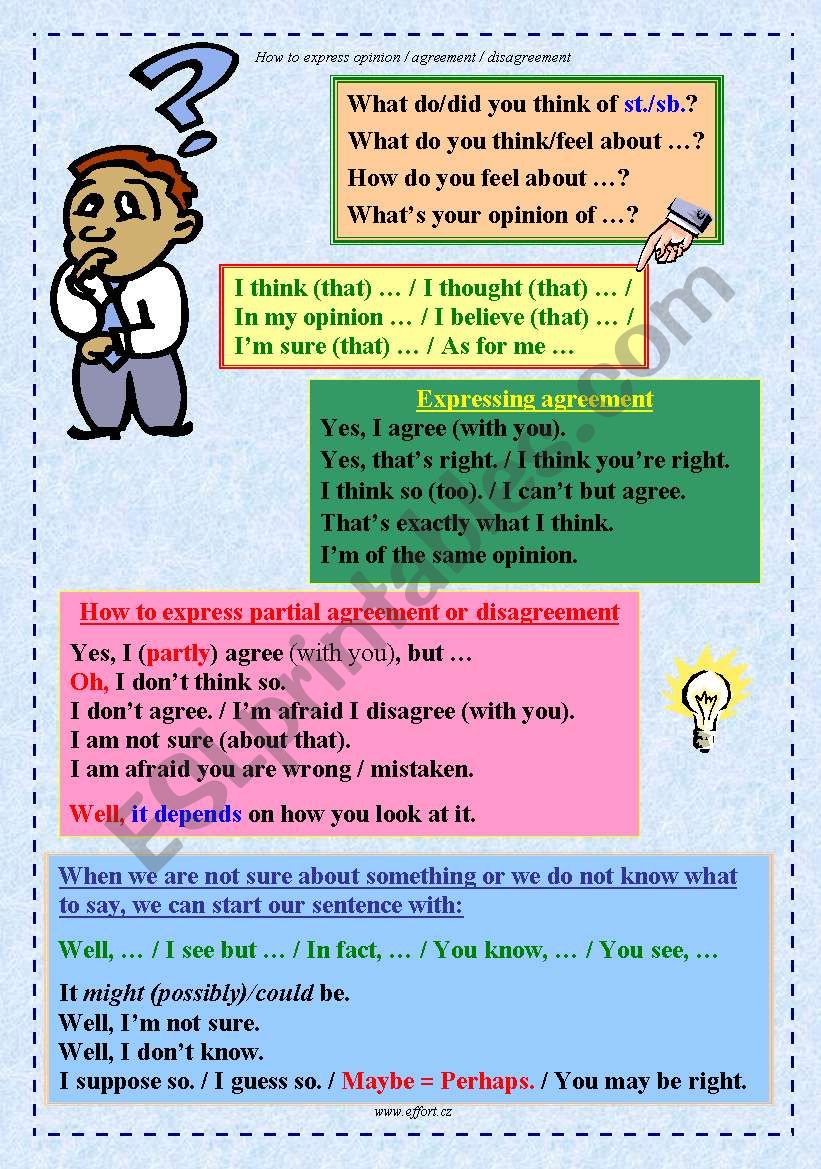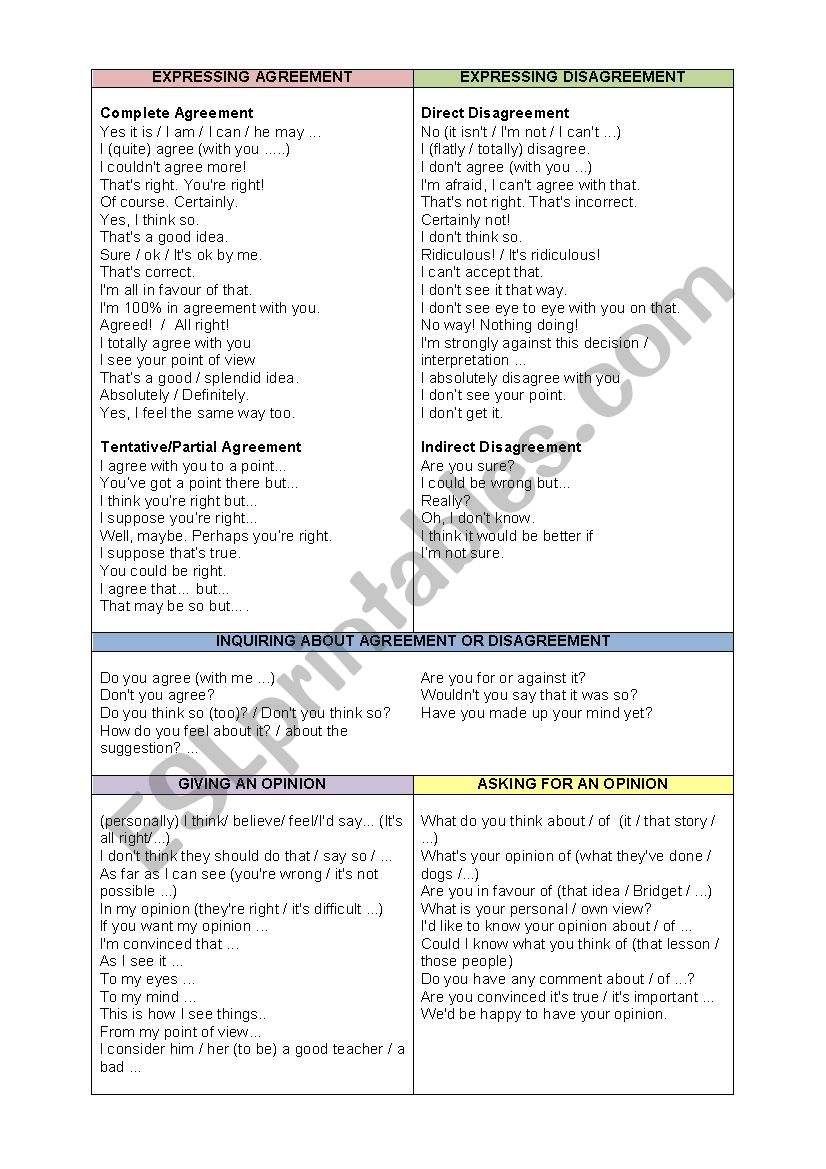How to Express AGREEMENT and DISAGREEMENT in English • 7ESL

Expressing agreement and disagreement
Here are some expressions you can use to agree and disagree. You will need to use these expressions in a discussion activity. Agreeing That's right! Absolutely! Exactly! Me too! Yes, I agree! I totally agree! I couldn't agree more! I see exactly what you mean! You're right. That's a good point. Disagreeing I don't agree! I totally disagree!

Expressing agreement and disagreement
As we teach in our English classes, an important part of speaking English is expressing opinions and agreeing and disagreeing with others' opinions. Let's imagine two different conversations with the women in the photo. In the first one, the two women are speaking. They agree with one another: Woman A: I think that mothers work harder than fathers!

How to Express Agreement, Partial Agreement and Disagreement in English English Study Online
The list below provides useful words and phrases to express agreement, partial agreement and disagreement in English. Learn more about the useful phrase for debating and discussing in English. Contents Useful Phrase to Express Agreement Expressing Agreement Expressing Partial Agreement Expressing Disagreement How to Express Agreement | Image

Expressing20 agreement20and20disagreement20speaking[1]
There are many ways you can express agreement and disagreement in English. Depending on the situation, some are more appropriate (fitting or correct) than others. "To agree" means to share the same opinion as someone or to accept their suggestion. "To disagree" means to have a different opinion.

expressing agreement and disagreemen… English ESL powerpoints
2. To decide something together. They agreed to go to Bali for their holiday. We agreed to meet at the park for a picnic. 3. To accept a suggestion or idea. She agreed to take the job. I agree to.

Expressing opinion, agreement or disagreement OLD version ESL worksheet by ohermann
Mastering agreement and disagreement in English is crucial, whether you're a native speaker or learning it as a second language. It's not just about saying "yes" or "no". It's about expressing your thoughts, affirming others' ideas, voicing dissent respectfully, and engaging in meaningful dialogue. Agreement plays an integral.

How to Express Agreement, Partial Agreement or Disagreement in English ESL Buzz
The two people or the group of people who are in agreement with each other or agree with each other are in a state of being in accord and harmony. They have an understanding and an agreement between them or among them. What do you understand by the term "Disagreement"?

How to Express AGREEMENT and DISAGREEMENT in English • 7ESL
Say goodbye to the frustration of searching for appropriate expressions or feeling unsure about how to sound more fluent. With Lillypad.ai as your trusted companion, you will gain the confidence, fluency, and linguistic dexterity to excel in the English language.

Expressing Agreement & Disagreement (Ungkapan Setuju & Tidak Setuju) YouTube
important part of expressing our opinions and sharing them with others. While it is important to express our opinions, disagreeing with others can have negative impact on people's social relationships. However, there are ways in which we can soften the negative impact of disagreement and lower the likelihood of offending others. This

How to Express Agreement, Partial Agreement and Disagreement in English English Study Online
Expressing agreement I agree with you 100 percent. I couldn't agree with you more. That's so true. That's for sure. (slang) Tell me about it! You're absolutely right. Absolutely. That's exactly how I feel. Exactly. I'm afraid I agree with James. I have to side with Dad on this one. No doubt about it. (agree with negative statement) Me neither.

Expressing agreement and disagreemen… English ESL worksheets pdf & doc
This. creates the opportunity to discuss how culture and status may affect the decision to. express disagreement, the extent to which disagreement is expressed, and the choice. of language used to express one's views. Explain that this unit will focus on. arguments between people of similar status.

expressing agreement and disagreemen… English ESL powerpoints
Agreeing and disagreeing. In this video, Emir and Paul discuss a design for a client. Listen to the language they use for agreeing and disagreeing and practise saying the useful phrases. Do the preparation exercise first. Then watch the video and do the exercises to check your understanding and practise the language.

Expressing Agreement/Disagreement ESL worksheet by mazrahwie
How to express agreement How to express partial agreement How to express disagreement How to express opinions in English How to express agreement In this section you have a series of expressions to show you how you can agree in English in many different ways.

Expressing Agreement And Disagreement ENGLISH4ALL
I completely / absolutely agree with you. I couldn't agree with you more. I feel the same. I guess/suppose so. I have come to the same conclusion. I have no objection. I have to side with you on this one. I hold the same opinion. I really think so. I see where you're coming from. I share your view. I simply must agree with that.

Agreement, Disagreement and Partial Agreement Phrases Examples English phrases, English
The way people agree or disagree in an argument or discussion varies in different languages. Agreement: It is worthwhile saying that silence is not understood as agreement. If you agree with an opinion or an idea, you are expected to say so. Expressions used to agree There is no doubt about it that. I completely / absolutely agree with you.

Expressing Opinions Agreement, Partial and Disagreement Expressions in English English Study
How to Express AGREEMENT and DISAGREEMENT in English Last updated on October 18, 2023 by 7ESL 11.6k There are many different ways to express agreement and disagreement in an argument. Learn these common phrases for agreeing/ disagreeing with an opinion with ESL images to improve your English. Table of Contents Agreement and Disagreement